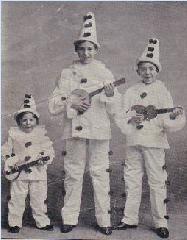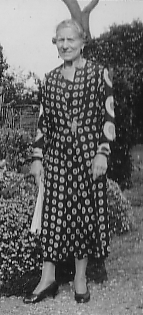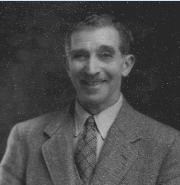
My Father, George Pollard Thomas
Born 6 June 1893 in Hampstead, died 4 April 1975 in Folkestone, aged nearly 82. His grandfather, also named George Pollard Thomas, had been a bootmaker who married Caroline Scrimshire in 1829, and their first-born was named after her and was thus a Caroline Thomas with a father of the same name as mine! I was never told that I was named for that reason, so this may be just a coincidence. When Caroline the mother died in 1850, George made a second marriage, to Eleanor Weiss, and one of her sons, born in 1884, was Harry Alma Thomas. In 1889 Harry married Henrietta Curt (1866-1954) and they had two sons: Alma Cyril and George Pollard, my Father. Harry died in 1896 when Daddy was still a toddler, and Henrietta was married a year later to John Uziella Bloor, and had a son Edward in 1901. This explains why she was always my Granny Bloor, not Granny Thomas. In the way that children accept things, I never thought this odd or asked why. This half-brother was my Uncle Ted Bloor, a farmer in Suffolk, and lived with Granny at Tudor Grange, Nettlestead, nine miles from Ipswich, until she died. He later married Nell Fuller, the widow of a fellow-farmer and great friend, and moved into their house Nettlestead Chase.
This photograph was on the front cover of a children's magazine 'Little Folks' published by Cassell in July 1905. It was repeated inside with a poem called 'Three Merry Pierrots'. My Father is on the right, Uncle Ted is the little one on the left, and the boy in the middle is their elder brother Alma Cyril Thomas.
Cyril served in the Royal West Surrey Regiment and died in November 1914 aged 23 at the rank of Lieutenant in Poperinghe Hospital, Belgium, from wounds received at Ypres. He lies buried in Poperinghe Communal Cemetery, due west of Ypres, in Plot 1, Row 13, Grave 7.
My Granny Bloor, Henrietta, known as Hettie.
The family and closest friends called my father "Tammy". Others called him "Brig". He was a modest man and never boasted, in fact he seldom talked about himself. I learned more about him from others after he died than in all the 33 years I had the privilege of being his daughter. These phrases, from reports announcing his death, from his funeral and memorial service, say it all:
"Few men did more for amateur dramatics - - -"
" - - a man of unbounded energy and dedication - -"
" - - the most tremendous character, and he cannot be replaced."
"He was not only an excellent administrator, but also a wise and patient ombudsman, healing many wounds, and quietly solving many problems, including financial ones, when he was ever ready to dip deeply into his own pocket to help out."
"Brig was of a breed which is all too rare --- selfless, painstaking, meticulous."
"It has been a move from an early feeling of awe to a sense of tremendous warmth and regard for a man whose grasp of detail in FHODS matters was equalled by his wide understanding of the amateur theatre throughout Kent."
"Everyone relied on his knowledge and his wisdom."
My Father was educated at Clifton College from 1900 to 1912, just overlapping with his brother Ted who attended from 1911 to 1918. He went on to the Royal Military Academy at Woolwich and was commissioned in the Royal Artillery in 1914, serving in both world wars. He was stationed in Gibraltar in 1914, France 1915-18, Ireland, Egypt, Sudan, Hong Kong, Singapore, Ceylon and India. For his service in World War One, he was awarded the American Distinguished Service Medal for service as artillery instructor to the Americans in France during 1918, was twice 'mentioned in despatches' and was awarded the OBE. In WW2 he was Lt.Colonel, promoted to Brigadier in 1942, and again mentioned in despatches.
His passions were amateur dramatics, organising the Folkestone tennis tournaments, and vegetable gardening. He was a member of the Kent Council of Social Services, with special responsibility for drama festivals, and had also been a member of the Civil Defence. The FHODS (Folkestone Hythe Operatic & Dramatic Society) occupied much of his time. He was its Chairman from 1942 to 1952, and then its Secretary until his death. He played a major part in setting up its original tiny theatre in central Folkestone, and then the larger one in an old church in Sandgate.



